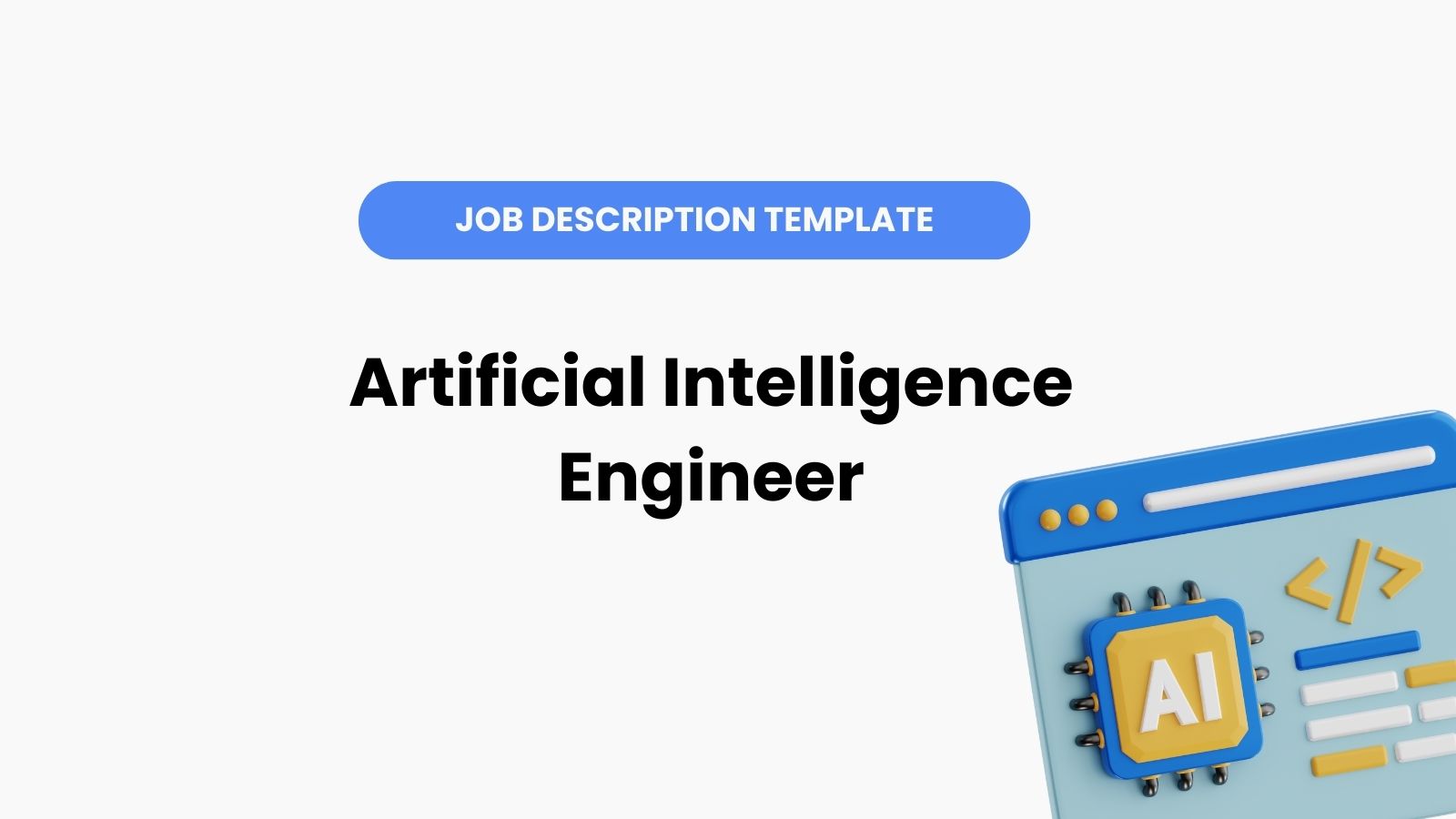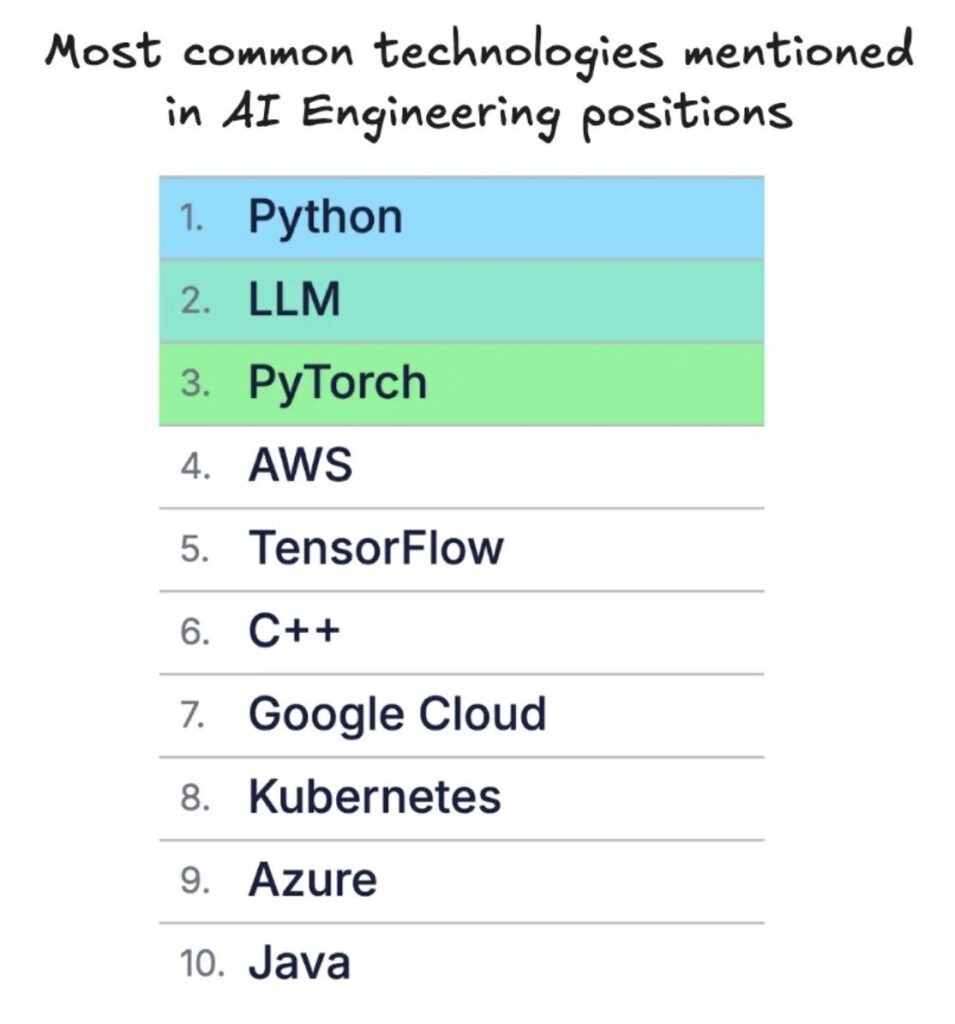Job Description Template
AI Engineer Job Description

With Python appearing in 71% of job postings and specialized roles like Generative AI Engineer emerging alongside traditional ML positions, the hiring requirements for AI engineer are evolving faster than most job descriptions can keep up with.
Let’s rethink how you approach this critical hire. Companies are moving away from hiring specialists who focus on single data tasks, increasingly preferring professionals who can manage data end-to-end and combine multiple skill sets. Here’s what that means for your next AI engineering search.
The Current Reality: What We’re Seeing with AI Engineering Roles
AWS (32.9%) and Azure (26%) now dominate the cloud AI market, with cloud deployment skills becoming as crucial as machine learning knowledge. Your AI engineer isn’t just building models—they’re architecting production-ready systems that scale across your infrastructure.
AI job postings have surged to 1.8% of all US listings in 2025, up from 1.4% in 2023, but here’s what most companies miss: the role has expanded beyond traditional boundaries. Today’s AI engineers need to understand everything from edge computing optimization to responsible AI deployment.
Core Technical Competencies: Beyond the Basics
Programming Foundation
- Python expertise (appearing in 71% of job postings) with deep knowledge of AI/ML libraries
- TensorFlow, PyTorch, and Keras for model development and deployment
- Java proficiency for enterprise AI integration (22% of postings require this)
- SQL expertise (17.1%) for efficient data management and querying capabilities
Machine Learning Architecture
- Deep learning neural networks with practical experience in CNNs and RNNs
- Reinforcement learning for robotics and game AI applications
- MLOps implementation for continuous integration and deployment
- Model optimization and performance monitoring in production environments
Cloud and Infrastructure
- AWS SageMaker ecosystem for training large models and managing massive datasets
- Azure integration with enterprise Microsoft environments
- Containerization with Docker and Kubernetes for scalable deployments
- Edge AI implementation for reduced latency and improved privacy
Emerging Technical Requirements
- Privacy-preserving machine learning using libraries like TensorFlow Privacy
- Generative AI and large language model integration
- Computer vision for healthcare, autonomous vehicles, and retail applications
- Natural language processing with transformer architectures
What Your AI Engineer Actually Does: Day-to-Day Responsibilities
Strategic Problem-Solving Your AI engineer starts by understanding your business challenges and translating them into technical solutions. They’re not just implementing existing models—they’re architecting intelligent systems that align with your product roadmap and growth objectives.
Cross-Functional Collaboration AI Engineers organize and collaborate with multidisciplinary teams including stakeholders, domain experts, software developers, ML engineers, data analysts, and data scientists. Communication skills aren’t optional—they’re essential for translating complex AI concepts to non-technical teams.
Production Implementation
- Design and deploy machine learning pipelines from research to production
- Implement monitoring systems for model performance and data drift
- Optimize inference speed and resource utilization for cost-effective scaling
- Ensure model reliability, security, and compliance with industry standards
Continuous Innovation In a field defined by change, the ability to keep learning is not just an advantage—it’s a necessity. Your AI engineer evaluates emerging technologies, conducts proof-of-concepts, and recommends strategic technology adoption.
The Skills Gap Reality: What Most Job Descriptions Miss
Technical Depth vs. Breadth The shift toward professionals who can manage data end-to-end means your ideal candidate combines deep AI expertise with broader engineering capabilities. They understand both the mathematical foundations and the production engineering required to deploy at scale.
Business Acumen Your AI engineer needs to connect technical capabilities to business outcomes. They should evaluate the ROI of AI initiatives, understand your competitive landscape, and recommend AI strategies that drive measurable results.
Ethical AI Implementation AI engineers must consider ethical implications and potential biases that might occur in AI systems. This includes fairness in algorithmic decision-making, transparency in model outputs, and compliance with emerging AI governance frameworks.

Qualifications: What Actually Matters in 2025
Educational Background
- Master’s or Bachelor’s degree in Computer Science, Engineering, Mathematics, or related quantitative field
- However, self-taught AI engineers can be equally valuable if they demonstrate hands-on experience with real-world projects
Experience Requirements
- 3+ years hands-on experience with machine learning model development and deployment
- Proven track record of building production AI systems that handle real user traffic
- Experience leading technical projects and mentoring junior engineers
- Portfolio demonstrating expertise across multiple AI domains (NLP, computer vision, etc.)
Specialized Knowledge Areas
- Statistical analysis and hypothesis testing for model validation
- Data engineering and ETL pipeline development
- Version control and collaborative development practices
- Understanding of software architecture patterns for AI applications
How to Evaluate AI Engineering Candidates
Technical Assessment Approach Move beyond theoretical questions to practical problem-solving scenarios. Present real business challenges and evaluate how candidates approach problem decomposition, technology selection, and solution architecture.
Key Interview Areas
- System Design: How would you architect an AI recommendation system for 10 million users?
- Model Selection: Walk through your approach to choosing between different ML algorithms for a specific use case
- Production Challenges: Describe how you’ve handled model drift, data quality issues, or scaling bottlenecks
- Business Impact: Share examples of AI projects that delivered measurable business value
Red Flags to Watch For
- Overemphasis on cutting-edge techniques without understanding of production constraints
- Inability to explain complex concepts in simple terms
- Lack of experience with real-world data quality and infrastructure challenges
- Poor understanding of AI ethics and bias considerations
Compensation and Market Dynamics
Workers with AI skills command significant wage premiums across all industries analyzed, reflecting the high demand and specialized nature of these roles. Expect competitive compensation packages, especially for candidates with proven production experience and leadership capabilities.
While 28% of executives expect generative AI to decrease software engineering workforces, 32% expect increases, with the overall trend moving toward workforce expansion. This suggests that investing in strong AI engineering talent now positions your company advantageously for future growth.
Making the Right Hire: Strategic Considerations
The AI engineering market rewards companies that understand the evolving nature of this role. Emerging roles such as Generative AI Engineer, Computer Vision Engineer, and Remote AI Training Specialist highlight the niche areas where AI talent is most in demand.
Your AI engineer should be more than a model builder—they should be a strategic technology partner who understands your business context, anticipates technical challenges, and delivers AI solutions that drive competitive advantage.
Given the current market dynamics and technical complexity, partnering with specialized AI recruitment experts can significantly improve your hiring outcomes while reducing time-to-hire for these critical roles.
Ready to find your next AI engineering hire? Let’s discuss how the current market trends impact your specific role requirements and identify the expertise your team needs to succeed.